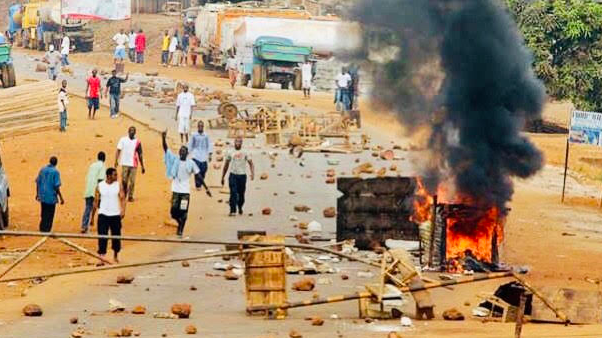There are frayed nerves in Guinea where opposition leader Cellou Dallien Diallo is still vehemently contesting incumbent Alpha Conde’s victory in the first round of the presidential election.
In Conakry, the lull hides a wind of revolt against the government. Immediately after the Independent National Electoral Commission (CENI) published the provisional results.
Supporters of the Union of Democratic Forces of Guinea (UFDG) took to the streets to denounce “an electoral hold-up.”
Clashes between security forces and demonstrators resulted in 21 deaths, according to the government, but the Cellou Dalein Diallo camp put the death toll at 27.
Condé’s main opponent during the October 18 presidential election was placed under house arrest two days later.
The home of the former Prime Minister ‘has been surrounded by the police and gendarmerie who prohibit any entry and exit from the compound, according to a tweet by Diallo.
Convinced that he had won the election “hands down,” Diallo exhorted his supporters not to give up “because there is no choice but to fight on.”
To prevent the country from going up in flames, the Economic Community of West African States (ECOWAS), the African Union (AU), and the United Nations (UN) sent a preventive diplomacy mission.
The mission visited Guinea from October 25 to 27, meeting Cellou Diallo who did not expect “much” from them because, in his own words they always sided with Alpha Condé.
In a joint statement dated October 27, the three organizations expressed regret over “the violence that has resulted in loss of life and destruction of public and private property. For such a situation not to recur, the delegation asked the state to ensure that “the defense and security forces act with restraint and professionalism.”
As further sign of a tense climate, Diallo accused the regime of kidnapping Kalemodou Yansane and Fodé Oussou Fofana at the end of the meeting with the tripartite mission.
The two vice-presidents of the UFDG have now been released according to local press reports.
The figures made public by the CENI gave Alpha Condé 59.5 percent of the valid votes and 33.5 percent for Cellou Diallo.
In turn, the European Union (EU) said it was taking note of the announcement of the provisional results, but not without expressing reservations.
“Although the ballot took place in a calm atmosphere, questions remain about the credibility of the result, especially with regard to the reporting of the minutes and the final counting of the votes,” the head of EU diplomacy, Josep Borrell said.
That is a strong statement on which the UFDG candidate relied to tackle ECOWAS and the AU.
According to Diallo, these two institutions must meditate on the example of the EU, which “defends democracy and human rights.”
Like the National Front for the Defense of the Constitution (FNDC), which had set itself up as a shield against a third term in office for Condé, the Union of Democratic Forces of Guinea intends to mobilise, in the streets and public squares to demand respect for the true outcome of the ballot box.
To date, no large-scale demonstration has taken place due to the fear of bloody repression by the army requisitioned to maintain order.
In Conakry, the military is deployed in neighborhoods favorable to the opposition.
And for several days, Guinea cut itself off from the outside world.
An Internet malfunction made international communications almost impossible.
But this blackout is interpreted by some Internet users as “a limitation of the freedom of expression and the right to information of citizens” in the era of social media.
ID/cgd/lb/as/APA


